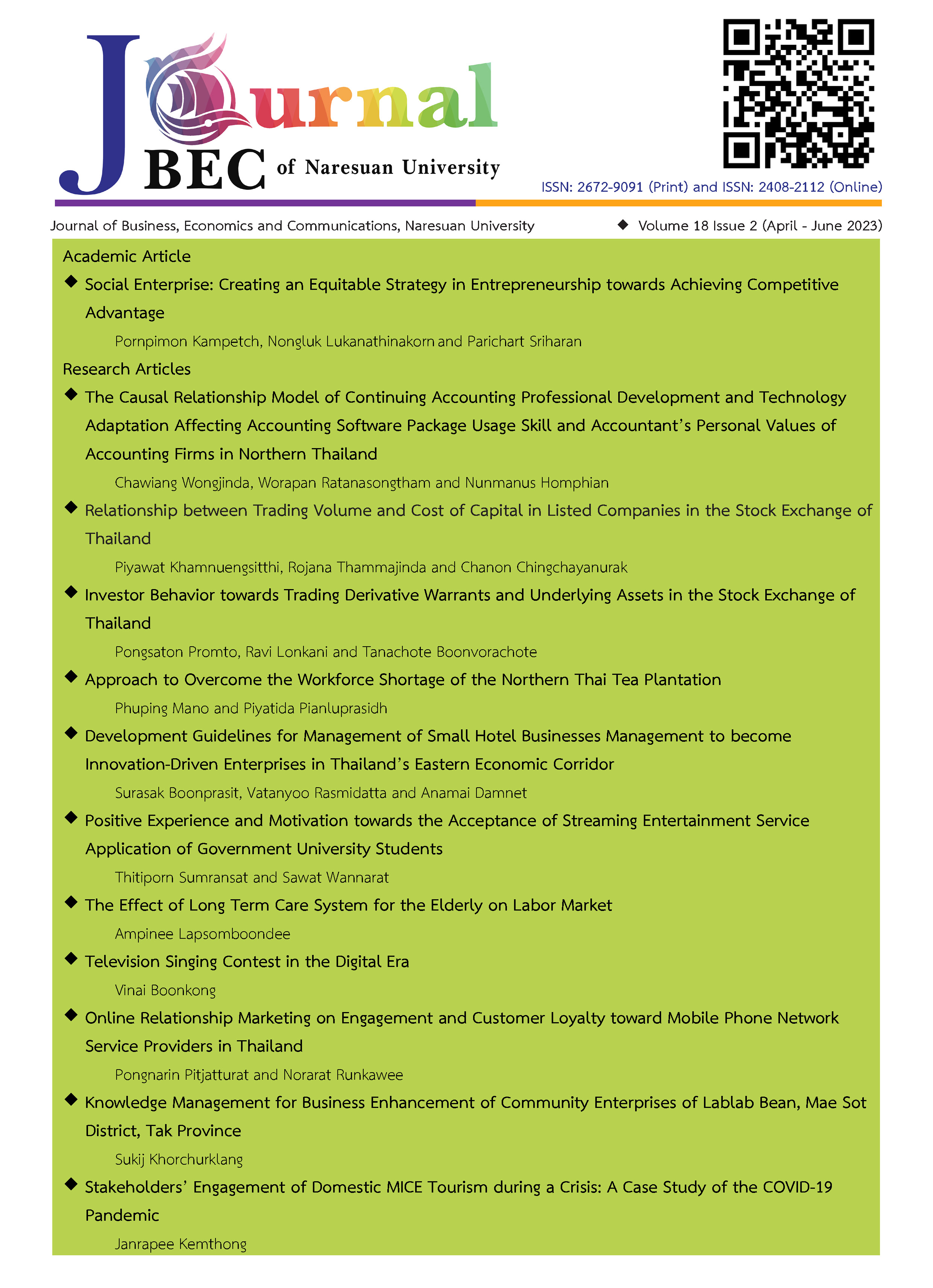Approach to Overcome the Workforce Shortage of the Northern Thai Tea Plantation
Main Article Content
บทคัดย่อ
This research investigates the problem of workforce shortage of tea plantations in the Northern region of Thailand. It is the first study to explore the issue. There are two research objectives; fristly, to study the workforce shortage situation in tea plantations in the Northern Thailand, and secondly, to study the approaches to overcome the workforce shortage in these tea plantations. This study was conducted by using the in-depth interviews on eight Assam-growing tea plantations. The results showed that half of the sample tea plantations were experiencing a workforce shortage. This is due to the changing population structure and the changing work values of the new generation who perceive agriculture as hard work. Tea plantations facing workforce shortages have different approaches to solving the problem, including the use of harvesting machinery; developing tea production methods to sell tea at a higher price; the use of job rotation in human resource management; and the employment of foreign workers and ethnic minorities.
Article Details

อนุญาตภายใต้เงื่อนไข Creative Commons Attribution-NonCommercial-NoDerivatives 4.0 International License.
เอกสารอ้างอิง
Arai, S. (2016). The current state of technological adoption in Sayama tea-producing area and developments in production organization. Japanese Journal of Human Geography, 68(2), 211-227.
Chantharat, S., Atthawanich, W., Sa-ngiamnet, B. and Chenpeungporn, C. (2019). Ageing society and productivity of agricultural family in Thailand. Retrieved June 15, 2020, from https://www.pier.or.th/wp-content/uploads/2019/06/aBRIDGEd_2019_013.pdf/
Chen, L., Apostolides, Z. and Chen, Z. M. (2012). Global tea breeding. Berlin: Springer.
Euromonitor International. (2020). RTD Tea in the World. Retrieved June 10, 2020, from https://www.portal.euromonitor.com/
Department of Trade Negotiations. (2020). Tea Market and Thai Tea. Retrieved September 20, 2021, from https://api.dtn.go.th/files/v3/5f48d4a1ef414051e32f1a8e/download
Fongmul, S. (2020). Effects of shortage of agricultural workers on food security in Chiang Mai. Journal of Agricultural Research and Extension, 37(1), 118-125.
Gupta, B., and Swamy, A. V. (2017). Reputational consequences of labor coercion: evidence from Assam's tea plantations. Journal of Development Economics, 127, 431-439.
Han, W. Y., Li, X. and Ahammed, G. J. (2018). Stress physiology of tea in the face of climate change. E-book: Springer.
Hasemi, T., and Ando, M. (2014). Structural changes in Taiwanese agriculture and introduction of employee labor systems. The agricultural marketing society of Japan. 23(3). 60-65.
Kyoto Prefecture. (2016). Kyoto Prefecture Tea Industry Promotion Plan. Retrieved November 21, 2019, from http://www.pref.kyoto.jp/nosan/documents/shinko-keikaku.pdf
Krumbiegel, K., Maertens, M., and Wollni, M. (2018). The role of fairtrade certification for wages and job satisfaction of plantation workers. World Development, 102, 195-212.
Mae Fah Luang University. (2018). Complete report – Thailand tea and coffee network conference. Tea and Coffee Institute, Mae Fah Luang University: Chiang Rai.
Makita, R. (2012). Fair trade certification: The case of tea plantation workers in India. Development Policy Review, 30(1), 87-107.
Moxham, R. (2003). Tea: addiction, exploitation and Empire. London: Constable.
Oxfam & Ethical Tea Partnership (2013). Understanding Wage Issues in the Tea Industry Report from a multi-stakeholder project. Retrieved November 21, 2019, from https://oxfamilibrary.openrepository.com/bitstream/handle/10546/287930/rr-understanding-tea--industry-wage-020513-en.pdf?sequence=1&isAllowed=y
Van Driem, G. L. (2019). The tale of tea: A comprehensive history of tea from prehistoric times to the present day. Boston: Brill.


